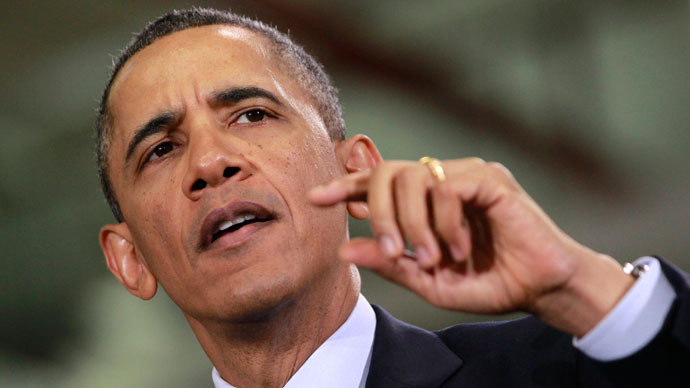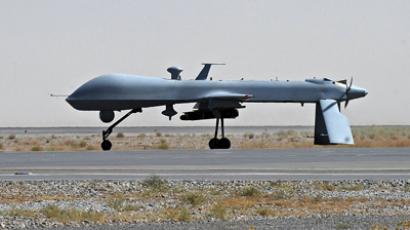Obama mulls stripping CIA of drones

The CIA could soon lose its power to pulverize suspected terrorists overseas with unmanned drones: United States President Barack Obama is reportedly close to transferring the intelligence agency’s drone program to the Department of Defense.
The Daily Beast writes this week that Pres. Obama is expected to sign off on an order that will end the Central Intelligence Agency’s ability to use unmanned aerial vehicles, or drones, and will instead relinquish the arsenal of UAVs to the Pentagon.
“The move could potentially toughen the criteria for drone strikes, strengthen the program’s accountability and increase transparency,” Daily Beast reporter Daniel Klaidman writes.
Currently, both the US military and the CIA manage separate but similar drone programs in order to single-in on targets and launch missile strikes, a maneuver that has become a hallmark of America’s wars during the first term of Pres. Obama’s presidency. At the same time, though, a massive backlash from foreign citizens, US politicians and the American public alike have largely objected to the use of the aircraft, particularly in the wake of leaked whitepapers that explain the president’s power to use armed drones to execute American citizens abroad without due process.
Both Pres. Obama and the Department of Justice have since said that no American citizen can be subjected to a government-approved extrajudicial execution, but members of Congress continue to demand details from the White House. Now if the drone program is officially handed over to the Department of Defense, the shroud of secrecy that typically cloaks CIA operations could be removed from one of its many elusive endeavors as the proverbial plug is pulled.
The CIA program, writes Klaidman, is one that is officially considered to be a “covert” mission, “which is to say it is not only highly classified, it’s deniable under the law,” he says. “That means the CIA, in theory, can lie about the existence of the program or about particular operations.” On the other hand, however, the military’s targeted kill program is not covert but clandestine, “which means it is secret but not deniable,” he writes.
Should the president re-write the rulebook for the targeted kill program, the CIA will likely continue to collect and analyze foreign intelligence but will be prohibited from personally overseeing the execution of targets using the remote-controlled killing machines. As Wired’s Spencer Ackerman notes, however, the maneuver might only mean new policies on paper.
“If the Obama administration decides to give the US military control of the CIA’s drone effort, the institutional changes to the controversial global drone strikes will be minor,” Ackerman writes on Wednesday. “That’s because the important leverage points over the drones — and the global, targeted-killing program they support — are political, not institutional.”
While Klaidman suggests the likely change means the White House wants to diminish the public’s damning perception that the president “is running a secretive and legally dubious killing machine,” Ackerman says a change of command won’t mean civilians overseas will be safe from the all-too long arm of America’s military might. While the CIA’s secret drone program in locales such as Pakistan and Yemen might land on the chopping block, the Defense Department drones that regularly search for and strike targets in Afghanistan, Yemen and Somalia will still remain intact.
And while the Daily Beast predicts that the retirement of a CIA drone program could mean more transparency as the Pentagon becomes the only powerful US entity to launch such strikes, Ackerman writes that that argument is still up in the air.
“Typically, though not always, the military’s lethal activities occur under a congressional grant of authority in the context of an armed conflict,” Klaidman says. When it comes to CIA activities, however, details about when, why or how a target is sought out can be kept under lock and key. Ackerman counters, “There’s an argument that giving the military control over the drones will lead to greater transparency around them: Maybe, but not necessarily.”
“The military is more likely than the CIA to openly testify about future drone operations, allow knowledgeable congressional staff into closed-door operational briefings and allow members of Congress to take tours of drone airbases,” he admits, “but that’s not to say that there will necessarily be more transparency of the military’s drone programs. Much depends on congressional prerogative, rather than institutional requirements.”
Klaidman acknowledges, “There’s nothing in the law that says the military has to brief congressional committees about its lethal activities.”
“Moving lethal drone operations exclusively to DOD might bring benefits. But DOD’s lethal operations are no less secretive than the CIA’s, and congressional oversight of DOD ops is significantly weaker” compared with congressional oversight that goes into CIA decisions, Harvard law professor and former Justice Department official Jack Goldsmith tells The Daily Beast.
Klaidman cites three anonymous US officials as his sources, and says the transition could take anywhere from one to four years, but would occur before Pres. Obama ends his second term as commander-in-chief and exits the White House.
“Barack Obama has got to be concerned about his legacy,” one former adviser tells Klaidman. “He doesn’t want drones to become his Guantánamo.”
Last month, Sen. Lindsey Graham (R-South Carolina) credited US drones with killing roughly 4,700 foreigners. “Sometimes you hit innocent people, and I hate that, but we’re at war, and we’ve taken out some very senior members of al-Qaeda,” he said. Just how effective those strikes are is still up for question, though. Researchers at Stanford University and New York University published a report last year that found that only 2 percent of drone casualties are top militant leaders, and the Pakistani Interior Minister has said that around 80 percent of drone deaths in his country were suffered by civilians.














